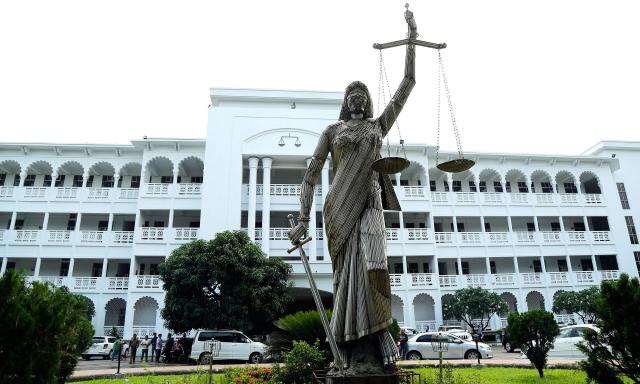'We will break every bone': Islamist leaders threaten Bangladeshi lawyer, WLUML Networker

Human rights groups have warned about the safety of a prominent Bangladeshi lawyer after Islamist leaders threatened to “break every bone” in her body for defending the installation of a Lady Justice statue outside the country’s supreme court.
Sultana Kamal’s remarks on a television talk show last month have earned her death threats from Muslim hardliners in Bangladesh, where religious fanatics are suspected to have killed 30 activists and writers among others in the past four years.
Kamal, the chair of anti-corruption group Transparency International Bangladesh, appeared in a televised debate in May about a Lady Justice statue that was installed outside the supreme court building last year.
Islamist groups including the hardline Hefazat-e-Islam campaigned to have the statue torn down on the grounds that its presence was an example of idol worship, forbidden in Islam.
During the debate, a Hefazat leader argued the statue was a religious object, and therefore had no place outside the supreme court of the country, which has been officially secular since it broke away from Pakistan in 1971. Kamal responded that by the same logic, “no mosques should be on the premises either”.
In response, Hefazat called for Kamal to be arrested or exiled within 24 hours. A senior leader of the organisation warned her: “If you come out to the streets, we will break every bone in your body.”
Kamal told the Guardian the threat had triggered a wave of “abusive postings on Facebook”, including images doctored to show the activist being lynched.
She said police had contacted her after the threats and were now regularly patrolling her neighbourhood, “just keeping an eye”.
“But I think the police should be filing a case against Hefazat-e-Islam,” she said. “They have openly threatened to kill me.”
Hefazat, a conservative mass movement based in the country’s privately run religious schools, has been growing in influence in Bangladesh, exerting pressure on the government to insert Islamic references into textbooks, ban men and women from mixing in public, and crack down on writers who “offend religious sentiments”.
A campaign started by the group and adopted by more mainstream Islamic movements led the government to relocate the Lady Justice statue to the front of another, less prominent building in the court complex.
This week, a coalition of human rights groups including Amnesty International called for police to investigate the threats of violence against Kamal and ensure she received adequate protection.
The joint secretary general of Hefazat-e-Islam, Mufti Faizullah, said the demands to arrest or exile Kamal were made by members of the organisation but did not represent its official position.
“Hefazat did not issue any statement officially or call for any movement against Sultana Kamal,” he said. “When one or two leaders of a large organisation make a demand, this does not become the demand of the whole organisation.”
But he added: “Ninety per cent of the people of this country are Muslim. If anyone gives any statement that goes against the sentiment of Muslim, people will not accept this.”
Bangladesh has been trying to curb a spree of high-profile violence against bloggers, atheists and secular intellectuals in the past years. Also targeted for murder – in attacks often claimed by Islamic State or al-Qaida – have been religious minorities, foreign aid workers and liberal Sunni Muslims.
The government, led by the secular Awami League, has been accused of underplaying the killings, unwilling to risk riling conservative Muslim groups less than two years before the next national elections, scheduled for January 2019.
Additional reporting by Mushfique Wadud in Dhaka


